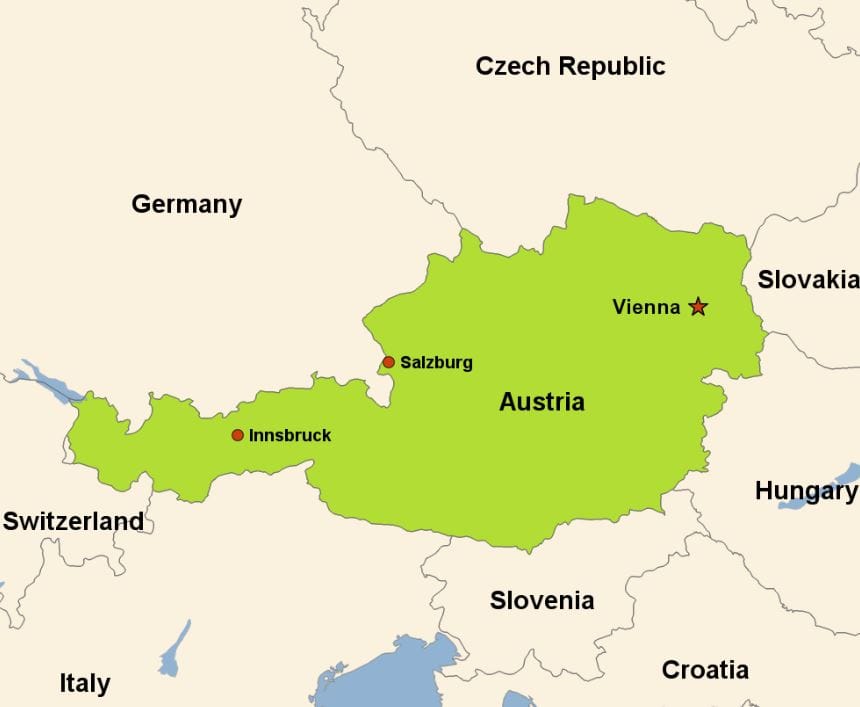Background
Austria has a population of 9.1 million and a working population of 5.9 million, of whom 1 per cent work in life sciences. The sector’s turnover is estimated to be around €25 billion (£22 billion) or about 5 per cent of GDP. The country spends 11.4 per cent of GDP on healthcare, which is above the OECD average of 9.2 per cent. There are about 1,000 life sciences companies in Austria, of which 40 per cent belong to the pharmaceutical sector and 60 per cent to the medtech sector. The revenue distribution is exactly the opposite, which is not a surprising result given the presence of many pharma multinationals, including Boehringer Ingelheim, Baxter, Fresenius, Merck GmbH, Novartis, Pfizer, Roche and Takeda.
Austria provides a 14 per cent tax credit for R&D that benefits the life sciences sector, and another support comes from the Austria Wirtschaftsservice Gesellschaft mbH (aws) which is an Austrian federal development and financing bank for the support and financing of companies.
There are various funding and support programmes available:
- LISA PreSeed and LISA Seedfinancing: these funding programmes specifically target startup ideas in the life sciences sector, providing financial support to help bring innovative ideas to fruition.
- BoB – Best of Biotech: this international business plan competition assists life science project ideas in developing commercially scalable business models. It serves as a platform to nurture startups and guide them towards successful commercialisation.
- AplusB-scale up programme: this initiative offers special support to startups originating from academic environments, aiding in their early-stage corporate development. Incubators funded by this programme provide resources and guidance crucial for startup growth.
- Venture Capital Initiative, founder and SME funds, guarantee and loan instruments: these financial mechanisms offer support to life science companies in various growth phases.
Vienna
Vienna is the capital and largest city in Austria, and its metropolitan area is home to around 2.9 million people (approximately 32 per cent of the entire population). The city is located in the middle of Central Europe with the Slovakian capital Bratislava 50 km (30 miles) to the east, the Czech Republic 60 km (36 miles) to the north, and the Hungarian border 60 km (36 miles) to the south-east. Vienna International Airport, situated southeast of Vienna, handled 29.5 million passengers in 2023. The Rhine-Main-Danube Canal connects Vienna to Germany and Rotterdam and Vienna's location along the Danube River facilitates transportation to Eastern European countries, stretching all the way to the Black Sea.

Science hub
Vienna's prominence as Austria's life science capital is evident from its concentration of companies, research institutes, and other relevant organisations in the sector. LISAvienna, the cluster platform for life sciences in Vienna that was set up by Austria Wirtschaftsservice and the Vienna Business Agency, estimates that the city hosts around 600 life sciences entities employing more than 40,000 people.
The city's life science industry features a broad spread of fields encompassing biotechnology, pharmaceuticals, medical devices, and digital health.
In Mödling, 14 km (8.7 miles) south of Vienna, a new laboratory building with safety level L3 is being built for the Agency for Health and Food Safety (AGES). The laboratory will be used to research zoonotic infectious diseases—those that can be transmitted between animals and humans. The new building, covering approximately 2,200 sq m (23,680 sq ft) will feature five flexible laboratory rooms, each with its own airlocks, and four multifunctional rooms. Completion is planned for the end of 2024.
Vienna's life sciences landscape is characterised not only by the presence of established global players like Boehringer Ingelheim, Octapharma, Ottobock, and Takeda Pharmaceutical Company but also by a vibrant startup ecosystem. The city's conducive environment for startups is reflected in its top ranking in the PeoplePerHour Startup Cities Index. The city excels in criteria such as the availability of talent, very high quality of life and relatively low rents, both commercial and residential (prime office rents are about 33 per cent of the Paris rate and only 18 per cent of the London rate according to BNP Paribas Real Estate statistics).
Several noteworthy startups have emerged in Vienna's life sciences sector, garnering international attention. The list includes names such as Apeiron Biologics, NASDAQ-listed Hookipa Pharma, Marinomed, mySugr, Themis Bioscience (which was acquired by Merck), and Valneva. Here is a recent success story:
In April 2024, Syntropic Medical, a medical device company spun out of the Institute of Science and Technology Austria (ISTA) by Mark Caffrey, Jack O’Keeffe, Dr Alessandro Venturino, and Prof. Sandra Siegert, raised a seven-figure amount from a VC fund and aws (described above) to further develop a pioneering non-invasive and non-pharmaceutical treatment for mental health disorders. Founded in 2023, Syntropic Medical’s unique light-based brain stimulation device is based on a light stimulation protocol, discovered by the Siegert Group at ISTA. Their technology opens up new avenues for the treatment of a range of mental health disorders, such as Major Depressive Disorder (MDD). - Article from EU-Startups
Vienna serves as the HQ for the Central European Diabetes Association, a collaborative international medical research association dedicated to addressing the challenges posed by diabetes.
Vienna's academic landscape boasts an impressive array of institutions dedicated to life science research and education, with the University of Vienna standing out as the oldest and one of the largest universities in Europe. It was founded over 650 years ago. The city is home to 17 other academic institutions focused on life sciences. These include five universities, two universities of applied sciences, and eleven non-university research institutes.

